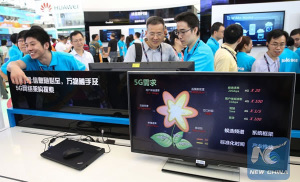Interview: Industries to benefit from China-EU 5G agreement
Interview: Industries to benefit from China-EU 5G agreement (Xinhua)
BRUSSELS, Oct. 8 (Xinhua) — The European Union (EU) and China signed a key agreement on fifth-generation telecommunications, or 5G, a week ago. As 5G will be the global industry standard for many different technologies, the industries in China and the EU will benefit from the closer collaboration, a European expert said.
Signed at China-EU High Level Economic and Trade Dialogue in Beijing, the agreement was described by the EU as a “milestone” in the global race to develop 5G networks.
“An ambitious and comprehensive China-EU agreement on the joint research and development of 5G would be a strong signal of the political will to progress together in this field, allowing for closer cooperation among the world’s biggest vendors and telecom operators,” said Luigi Gambardella, president of ChinaEU, a business-led association that aims to strengthen joint research and business collaboration and investment in Internet, telecommunications and high-tech between China and Europe.
The expert told Xinhua, 5G, aiming to provide seamless connectivity everywhere and all the time, is much more than just an improvement of the current mobile technology, allowing faster smartphones and tablets.
For China, EU and the whole world, 5G is the future, Gambardella said, noting that it is a strategic technology for both China and the EU, being it at the core of the revolutions of Industry 4.0 and Internet Plus.
“5G heralds the start of the digital transformation of our lives,” he said. “Potentially everything can be connected, for example, cars, household appliance, office equipments.”
When 5G comes to a reality, vendors producing network equipments and companies producing high-tech equipment necessary to equip cars, trains, central heating and air-conditioning systems, fridges, elevators, etc will have tremendous opportunities to grow, Gambardella said.
China-EU’s cooperation on 5G is a move to seek an edge in global digital competitiveness. Winning the global race will give a strong momentum to further development of industries in China and the EU. Otherwise, the industries will pay high price in the future, the expert told Xinhua.
For example, 5G will require a blend in various spectrum bands, from sub 1 gigahertz spectrum all the way up to the 40 and even 80 GHz bands, the expert introduced. “If connected cars use other frequencies in Europe and China, this will reduce economies of scale for the production of the required equipment and complicate exports,” Gambardella warned.
“The industries are waiting for, to pass to the next production stage, the visibility on the calendar of the deployment of 5G, the identification of the applications and global standards for 5G,” the expert said.
“This is why it is so important for China and the EU to work together in 5G research,” he added.
Under the deal, the EU and China will seek to reach a global understanding on the concept, basic functionalities, key technologies and time plan for 5G by the end of this year. Gunther Oettinger, EU Commissioner for the digital economy and society, said signing the agreement with China “is a crucial step in making 5G a success.”
Gambardella echoed the commissioner from the perspective of industries, saying that China has the expertise and the manpower to be in the leading position to provide these new high-tech products and applications.
Taking ZTE, a leading member of the ChinaEU association, as an example, the expert said, the Chinese company was the first to propose the pre-5G concept, which caused a sensation in the industry.
Last November ZTE and China Mobile completed testing the world’s first pre-5G massive MIMO base station. Pre-5G adopts the most practical core 5G technology, provides a user access experience close to that of 5G and is compatible with LTE terminals already in the market, Gambardella said.
Noticing that 5G is a domain characterized by fast innovation, the expert said “setting standards” for 5G should be one of the priorities in the China-EU cooperation.
“Only global standards will ensure full interoperability of connected devices and communications networks,” he said, calling China and the EU leverage their unique technological and market strengths collaboratively to establish a major strategic presence in future 5G mobile markets globally.
The EU is the most important export market for China. Last year an impressive 37 percent of all ICT-related imports in the EU originated from China. At the same time, China represents a key export market for many EU industries, with automotive and high tech manufacturing being a case in point.
For this reason, the President of ChinaEU expected the two sides will deepen digital sector cooperation in other key domains as well as in 5G.
“ChinaEU is of the opinion that a more ambitious target should be pursued: the creation of a genuine transcontinental Digital Single Market encompassing the EU and China along the Digital Silk Road,” Gambardella wrote in his letter to EU Commissioner Oettinger.
He suggested that the EU Digital Single Market should be widened to China to create a market of nearly two billion end-users.
“We believe that such initiative could greatly foster the relaunch of economic growth both in China and the EU,” the expert said.


